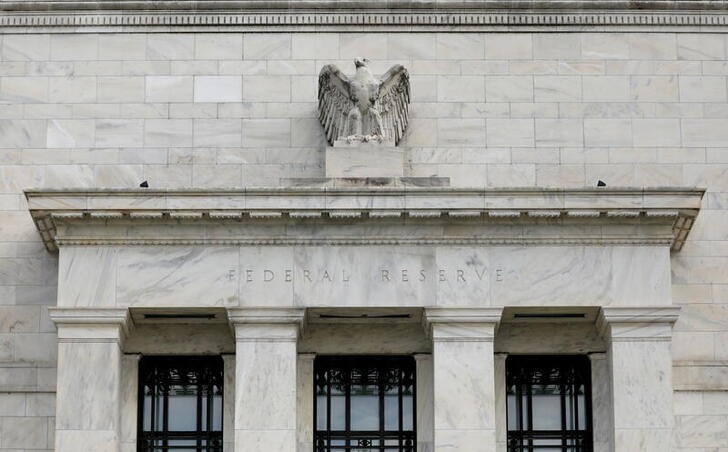By Shrutee Sarkar
BENGALURU (Reuters) - The U.S. Federal Reserve will raise rates in the third quarter of next year, earlier than expected a month ago, according to economists in a Reuters poll who mostly said the risk was that a hike comes even sooner.
That shift in expectations for lift-off to Q3 from Q4 next year was driven by persistently higher inflation and now brings economists' views almost in line with market pricing.
However, rising COVID-19 cases around the world and the emergence of the Omicron coronavirus variant, along with renewed restrictions in some countries underscore that the pandemic is not yet over.
Still, the Dec. 3-8 poll predicted the Fed would raise rates by 25 basis points to 0.25-0.50% in Q3 2022, followed by three more hikes - in Q4 next year and Q1 and Q2 of 2023. The fed funds rate was expected to reach 1.25-1.50% by end-2023.
"We currently have September and December rate hikes in our forecast, but if scientific evidence suggests we are not entering a darker period for the pandemic we would imagine three hikes is far more likely," said James Knightley, chief international economist at ING.
The timing shift to the third quarter of next year was also underpinned by Fed Chair Jerome Powell saying the central bank would discuss in December whether to end its $120 billion in monthly bond purchases a few months sooner than anticipated. Previous expectations were for it to end in mid-2022.
More than 60% of respondents to an additional question, 22 of 35, said the program would end by March. More than 80% of respondents, 30 of 36, said the risk to the timing of the first hike in this cycle was that it comes earlier.
Sixteen said a hike could come in the second quarter of 2022 and five said it could come as early as next quarter. Just a month ago only five economists said the Fed should hike in Q2 next year and four said Q1.
"We are penciling in the first hike in June, but with a risk it happens as early as March. It is a very close call, but we want to wait to see more data, including the impact of Omicron on the economy," said Ethan Harris, global economist at Bank of America (NYSE:BAC) Securities.
Economists were split on the biggest downside risk to the U.S. economy next year with 18 of 36 saying new coronavirus variants and 15 choosing high inflation.
Participants in the poll expect the core personal consumption expenditures (PCE) price index, the Fed's key inflation gauge, to stay above 4% this quarter and next - double the 2% target - before slowing in the second half of 2022 along with growth.
Those forecasts were largely unchanged from last month, underlining the fact persistent price pressure remains a challenge for the Fed, and most other major central banks.
"Reduced demand for virus-sensitive services such as travel could have a disinflationary impact in the near term, but prior virus waves suggest that such pressures would be temporary and reverse as demand recovers," noted Joseph Briggs, economist at Goldman Sachs (NYSE:GS).

"In contrast, further supply chain disruptions due to Omicron or further delays in the recovery of labor supply could have a somewhat more lasting inflationary impact."
(For other stories from the Reuters global economic poll)